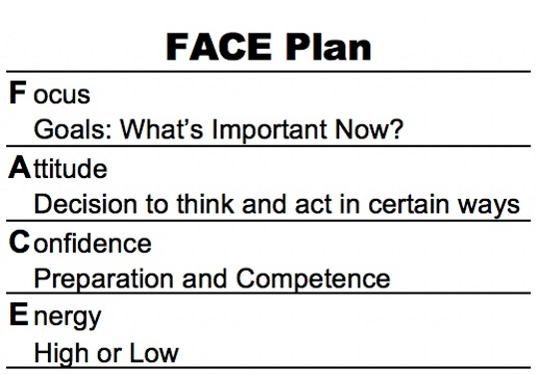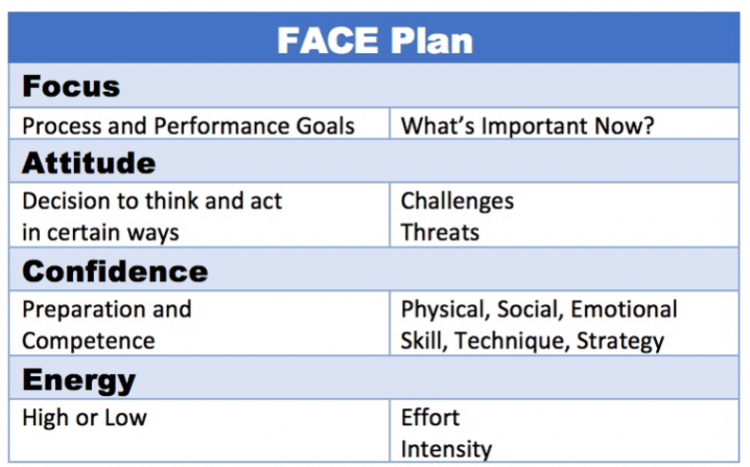(2 Minute Read)
In my experience as a Mental Performance Coach most of the questions I get regarding performance can be answered by creating a mental plan. Mental plans can be as simple or complex as needed. They can be made to address everything from general day-to-day life to sport performance, including, but not limited to pre-competition, competition, post-competition and recovery plans.

The FACE plan provides a simple, easy to use structure to build a mental plan. FACE is an acronym that stands for Focus, Attitude, Confidence, and Energy. Loosely borrowed from the military’s contingency PACE planning strategy, the FACE plan provides a complete mental plan while quickly prioritizing mental tools and skills.
Focus is one of the main themes in mental toughness, resilience, and expertise. The most effective way to establish and maintain focus is to have a goal. A goal is often written and spoken in terms of outcomes, or results. However, goals are more successful if we think of them as a plan to create the results we want. By setting goals centered on how well we execute the skills, techniques, and strategies, we stay focused on What’s Important Now (W.I.N). In addition, we will be better prepared for dynamic situations and unexpected events.

Attitude separates the winners from the losers, the best from the better, and the elite from the very good. When everything else is equal, the people with the strongest attitudes rise to the top. Attitude is one thing we can always control because it is a decision we make to think and act in certain ways. When we encounter or anticipate situations, we assess that situation’s relative worth as a threat or a challenge. The best approach is to see things for what they are, with no judgment. Very few things in the world are inherently “good” or “bad,” it is the way we think about them which determines their value. By making a “value-neutral” assessment first, we are more likely to make effective decisions about how we think and act. In other words, by making more logical value assessments, we demonstrate better behaviors at the moment.
Confidence has long been oversold as a mystical feeling we must have to perform well. However, it is really not that complicated. Confidence is the way we estimate our ability to handle the situation based on our preparation and competency. If we prepare physically, socially, and emotionally and choose the best skill(s), techniques, and strategies for the challenge, we can make a realistic estimate of how well we will perform in that scenario.

Energy may be the most subjective aspect of the mental plan and plays a central role in our performance. Think of effort as an expenditure of mental and/or physical power. Additionally, you can plan for energy levels regarding moments of calm, patience, intensity, assertiveness, and curiosity. If we anticipate being bored or anxious, we should reconsider our assessment of our skills, techniques, strategies, and possibly our attitude.
With a little practice, the FACE plan becomes an easy method of building a sound mental plan in a few easy steps. Determine what is important now, decide how to think and act, determine your preparation and competencies, then decide what level of energy you will need. It’s quick, it’s easy, and it’s repeatable for any challenge you will FACE.
